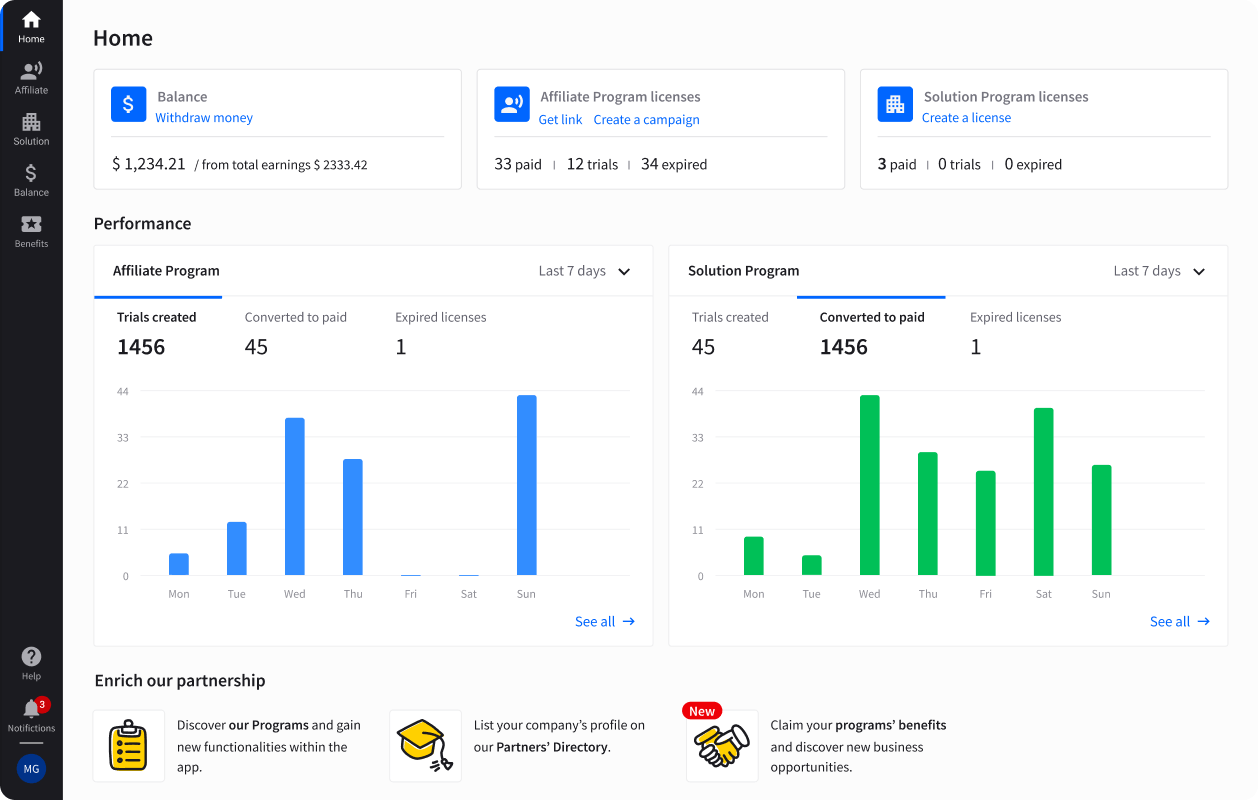Showing top 0 results 0 results found
Showing top 0 results 0 results found
7 Best AI Conversational Tools Businesses Can Use To Introduce AI Customer Service

Chat GPT3. Everyone is talking about it. It's all over Twitter, LinkedIn, and every other major publication. You can't escape it.
And with that comes many different opinions of the AI conversational tools that are taking the world by storm. People either embrace it with open arms or run away from it, hoping it doesn't trample them and steal their jobs in one fell swoop.
Even Google is pounding the (red) alarm. But we're not here to discuss if AI conversational tools are the doomsday event that'll wipe out Google and SEO agencies for good.
Today we're focusing on how these AI conversational tools can help businesses streamline various processes and tasks within their organizations. Now that doesn't sound so scary, does it?
This article will cover the basics of conversational AI tools for marketing and customer service. We'll discuss the technology behind the curtain and review the top 7 conversational AI tools in 2023 and how they can be used for business process automation.
Are you ready to learn more?
Let's dive in.
What are conversational AI tools?
Conversational AI tools are software technologies that enable natural and human-like communication between computers and humans.
These tools leverage natural language processing (NLP) and natural language understanding (NLU) technologies that help computers understand and interpret human language. Natural language generation (NLG) technologies then enable computers to produce human-like language.
Examples of conversational AI tools include chatbots, virtual assistants, and voice assistants for customer service, marketing, and other communications tasks.
GPT (formally known as Generative Pre-trained Transformer) is a neural network-based language generation model developed by OpenAI.
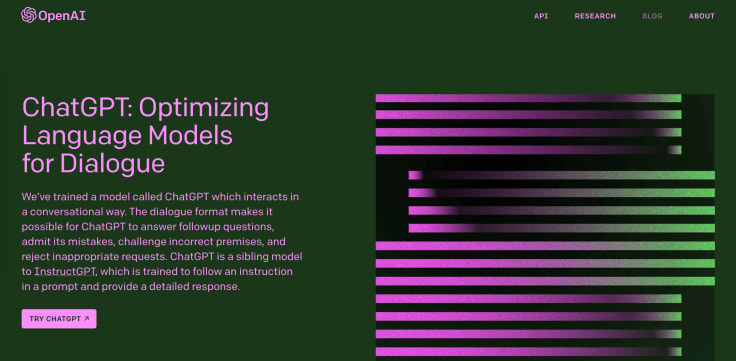
Because of the large amount of data the model was trained on, GPT generates highly coherent and realistic text on various topics. It can complete various natural language processing tasks, such as language translation, question answering, text summarization, text completion, and text generation.
GPT is also considered one of the most advanced conversational AI tools because of its ability to understand the context and generate human-like responses in real time. It can understand things like a person, write stories, and have a full conversation.
GPT learned all this by scouring and reading copious examples of how people write and speak (almost like it taught itself). Think of it like having a super smart writing buddy that you can ask to write stories or answer questions for you.
Some professionals are eager to jump behind this technology, while others remain skeptical.
These tools can effectively put together bodies of writing that are mostly cohesive and accurate, but they can lack the nuance and dimension that a creative hired writer brings. By developing a better understanding of what conversational AI tools are and the roles that they play, organizations can leverage this technology for their various operations.
Top 7 conversational AI tools
Now that we've covered the basics of AI conversational tools, let's review some of the best tools to use in 2023 to boost your customer service workflow. Learn how to take advantage of AI-powered customer service to develop your business.
1. ChatGPT
ChatGPT is a conversational language model developed by OpenAI.
Like other GPT 3 tools, ChatGPT generates human-like text, but it's been specifically fine-tuned for generating responses in a conversational context. This makes it well-suited for dialog generation, automatic email response, chatbot development, and understanding simple tasks.
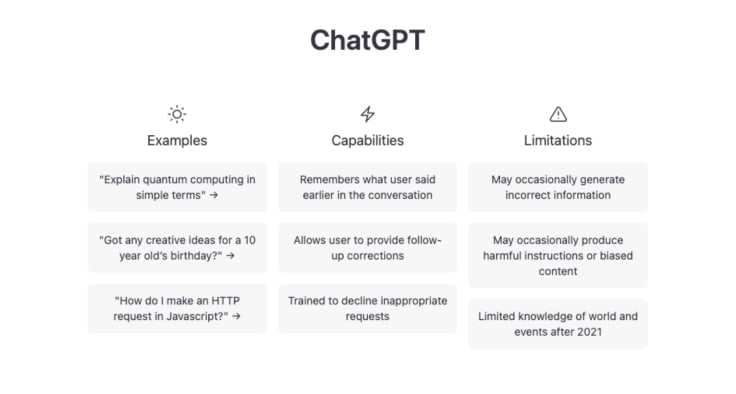
Main features:
- Conversational AI model that can generate human-like responses from a basic input.
- The ability to fine-tune for specific tasks or questions like chatbot development, language understanding, and writing lines of code.
- Adjusts to the current context and understands the ongoing conversation.
- Generate responses even with incomplete prompts.
Pricing: Currently, ChatGPT is free to use during the research preview.
2. ChatBot
ChatBot is another very popular conversational AI tool. This tool helps integrate automatic and comprehensive chat feeds into business websites. The company can use it for an automatic text response to relieve the customer service department.
The purpose of ChatBot is to help businesses enhance their customer service by optimizing workflows and improving their support availability via chat software.
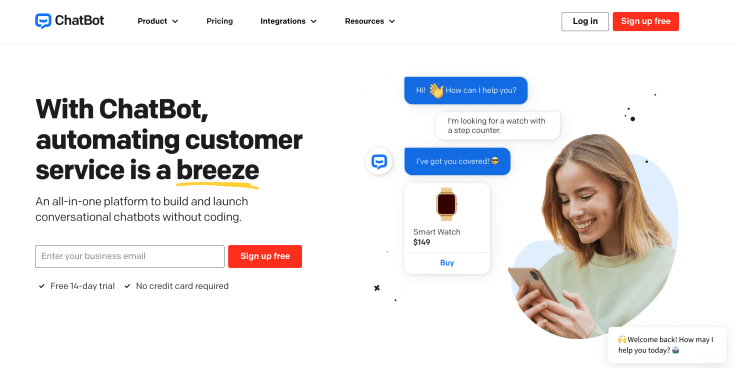
Main features:
- No-code chatbot builder for simple installation.
- Chatbot Testing Tool to verify they are working as intended before pushing live.
- Free Chat Widgets that are customizable to match your visual brand identity.
- Integrations across your website, LiveChat, Facebook Messenger, and Slack.
Pricing: The ChatBot Starter plan starts at $52/month.
3. IBM Watson Assistant
IBM is a media giant, so it is no surprise that they offer a comprehensive conversational AI tool.
IBM Watson Assistant is a conversational AI platform developed by IBM. It allows businesses and developers to build, train and deploy chatbots and virtual assistants for various use cases such as customer service, e-commerce, and information retrieval.
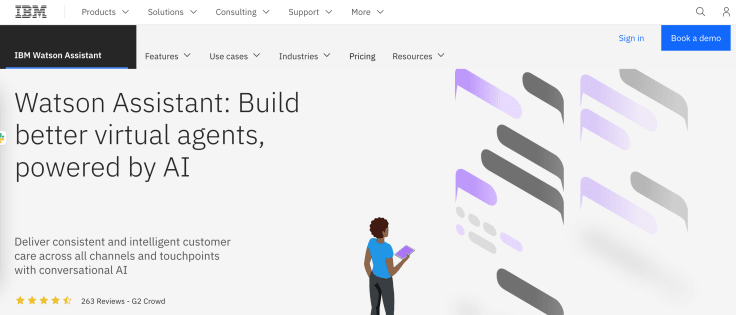
Main features:
- Use natural language understanding (NLU) and natural language processing (NLP) technologies to understand and respond to user input in a human-like manner.
- A user-friendly interface to facilitate the creation and management of conversational flows.
- Numerous integrations with other systems and platforms.
- Enhanced security features to protect data privacy.
Pricing: The Lite plan from IBM Watson Assistant is free, but the most popular plan, Plus, starts at $140/month.
4. Replicant
Replicant is a conversational AI tool that supports businesses across various industries, including e-commerce, hospitality, healthcare, and more. It's a single platform providing all the tools necessary to automate your contact center.
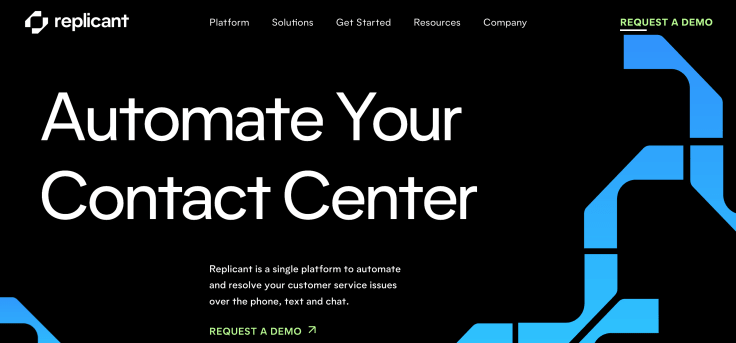
Main features:
- Automated phone support in addition to text and chat.
- Replicant's Thinking Machine provides a natural conversation to avoid long wait times and automated sequences.
- Access to pre-built templates and use cases for quick adoption.
- Custom analytics dashboard with metrics like call success rates and conversation data.
- Seamless integration with out-of-the-box tools
Pricing: Replicant offers a cost-per-minute pricing structure, so you only pay for what you use.
5. Jasper
Jasper is a conversational AI tool that's dedicated to copywriting for marketing.
Jasper was created alongside a team of marketers and SEO specialists to help make this AI more effective in diverse marketing use cases. You can use Jasper to write blog posts, social media posts, landing pages, and more.
But more recently, after a $125 million Series A funding round, Jasper has recently entered the chat (pun intended). You can try a new, more conversational way of interacting with generative AI with Jasper Chat.
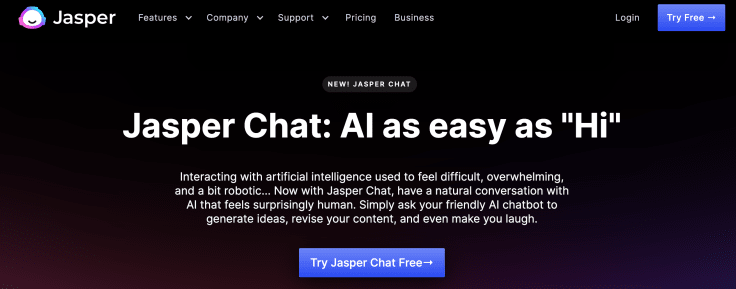
Main features:
- Expertise in any niche.
- Intuitive, user-friendly design for everyone to try.
- Enhanced context through the memory of the previous conversation.
- Rapidly generate relevant and unique content through AI.
- Support for 29 languages for content generation.
Pricing: This tool is great for those who are just starting to explore writing AI since it offers 10,000 words for free. The paid plans start at $49/month to unlock premium features. Jasper Chat is also free to try.
6. Cognigy
Cognigy is a low-code conversational AI tool geared towards enhancing customer service.
It offers a range of solutions to improve customer interactions through AI assistants, such as connecting customers to the appropriate department and representative, helping employees handle complex customer issues, and automating actions through smart processes.
What's cool about Cognigy is that it is suitable for businesses that serve diverse demographics since it "speaks" various languages.
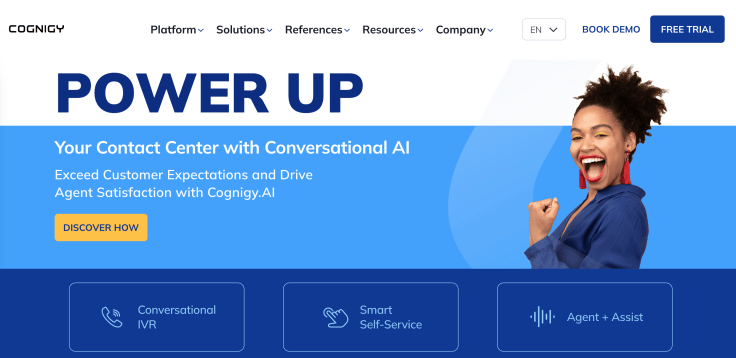
Main features:
- Ability to set up "live agents" with unique names, industry specifications, and more.
- Digital agents that mimic human communication in a customer's preferred language
- 24/7 consistent communication across customer's preferred channels
- Advanced augmented analytics to boost customer satisfaction
Pricing: You must book a demo call with the sales team for additional pricing information.
7. Convy.AI
Convy.AI is a tool for businesses that provide omnichannel chat to create a cohesive brand experience across many platforms.
This tool can facilitate engagement and conversations for your brand through Telegram, Facebook Messenger, your website, and more.
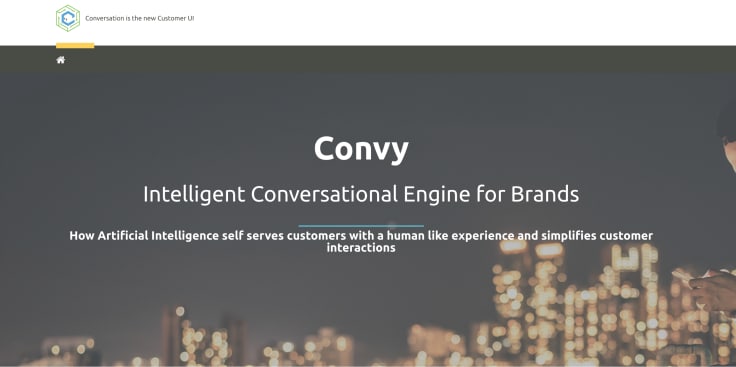
Main features:
- Create automated conversations without coding using the easy BOT builder.
- Digital contact center with advanced agent tools and supervisor tools.
- Collect customer interaction history across all touchpoints.
- All-in-one platform to manage your online customer needs.
- A seamless shift from self-service to assisted service, based on context, moving from BOT to human agents.
Pricing: Custom prices are available via a discovery call with the sales team.
Conversational AI tool use cases
There are many use cases for conversational AI tools. However, since the human touch is still important in many scenarios, AI is not a one-size-fits-all solution for writing and communication.
Here are a few of the top use cases for using conversational AI tools to improve customer service:
Reduce wait times
Good things come to those who wait — unless you're on hold with customer service, then it's just a long wait.
Almost 60% of customers consider lengthy wait times and hold times to be the most irritating aspect of the customer service experience.
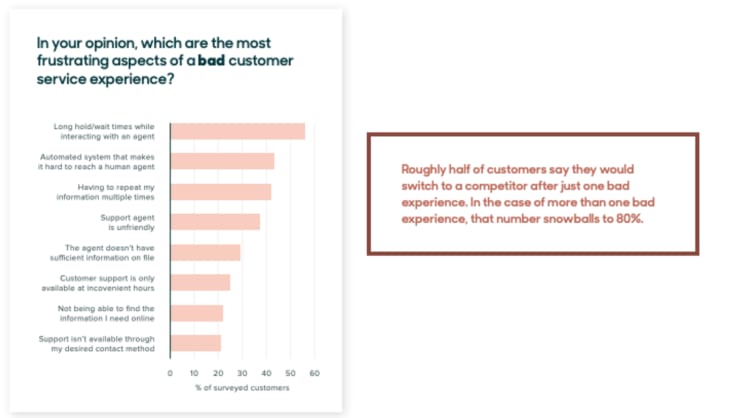
High inquiries and understaffed support teams usually cause these wait times. With the help of conversational AI tools, it's possible to mimic one-to-one support, which means nobody is left waiting.
AI removes the restricting factor of having enough human bodies to help take every incoming call. Chat tools can also reduce customer wait times by automatically submitting a request, inquiry, or ticket (avoiding manual intervention).
Conversational AI has proven valuable in any industry notorious for long wait times and poor customer service, especially in the banking sector.
These companies can now provide customers with instant support for checking account balances, applying for the right credit card, or even opening a student bank account without waiting on hold for hours on end.
AI conversational tools are the secret weapon for taking your customer service from a one-star review to a shiny five-star review. It's worth the investment tenfold.
Craft web pages
Conversational AI tools can be very useful for crafting web page copy, especially if you're creating pages in bulk to target different segments of your audience.
Here's a sample output from ChatGPT about a landing page for an eco-friendly kid's toy company:
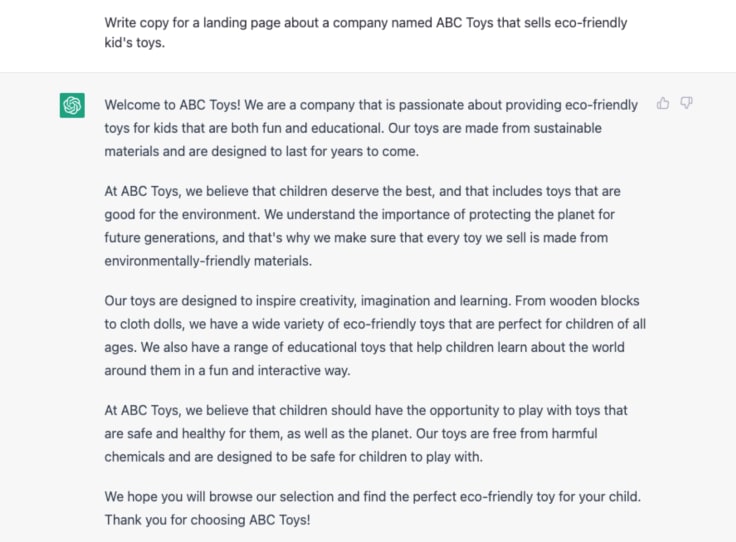
The output is ready in under 30 seconds. Is it perfect? No. But with a bit of human flair, you can have a full-blown landing page ready to go live in a fraction of the time it takes a copywriter to write from scratch.
A well-designed website with easy-to-follow copy improves the customer experience. Especially for complicated products like cyber security related. Non-technical copywriters can write content like this page about DDoS attack prevention, saving time for double-checking details.
The easier it is to navigate, the fewer questions the user will have for customer service representatives. Don't underestimate the value of a landing page with content that's clear and easy to follow.
In addition to your standard landing pages or sales pages, you can also use AI to help you create the less exciting pages of your website.
For example, if you collect first-party data from your customer, your business needs to have a privacy policy that's tailored to your needs and that follows data protection restrictions. You can easily generate a free privacy policy with no hassle at all.
That way, you can spend less time on mundane tasks and more time on building relationships with your customers.
Provide 24/7 customer service
When you use conversational AI tools, you can improve the availability of your customer service team. A bot can be available 24/7 to offer support when it's outside of working hours for your team.
For example, almost every real estate website takes advantage of chatbots, which have become important for increasing engagement with prospects.
Especially for clients with insomnia scrolling through property listing after listing, looking for their dream home, and finally finding something they love at 3am.
Since the brokerage has a chatbot on its site, the client can book a tour for Friday and drift off to sleep, knowing that their dreams could soon be a reality. No more stress or wasted sleep over the fear of missing out.
And this solution can be applied to any business. Even sites for pet insurance operate with chatbots for quick and effective customer interaction.
But it doesn't stop at chatbots. Did you know that more than 50% of businesses agree that texting is the most effective communication channel?

There are so many distractions in today's world, and it can be hard to grab people's attention. They'll quickly scroll through your emails, delete your voicemails without listening, and block your pop-up ads.
But with business SMS, you can extend customer service to a device they never seem to put down. And you can automate and send messages at optimal times, regardless of the time of day.
Streamline internal operations
Public or customer-facing use cases are huge for conversational AI, but these tools can also be valuable in streamlining internal use cases.
You can weave conversational AI tools into your tech stack to maximize results.
Ideally, you want your team to spend less on manual tasks and more on growing customer relationships or on other growth initiatives that benefit the bottom line.
For instance, you want to hire the best possible customer service representatives as a startup company. So you outsource to Matchr to help you find the right HR software system to help you grow and track your applicant headcount.
The tool takes out a ton of manual work but still requires some thought and effort.
That's where conversational AI tools (like the ones we covered above) can cut through the noise and further streamline the process. For instance, you can use AI writing tools to write offer letters in minutes instead of days or hours:
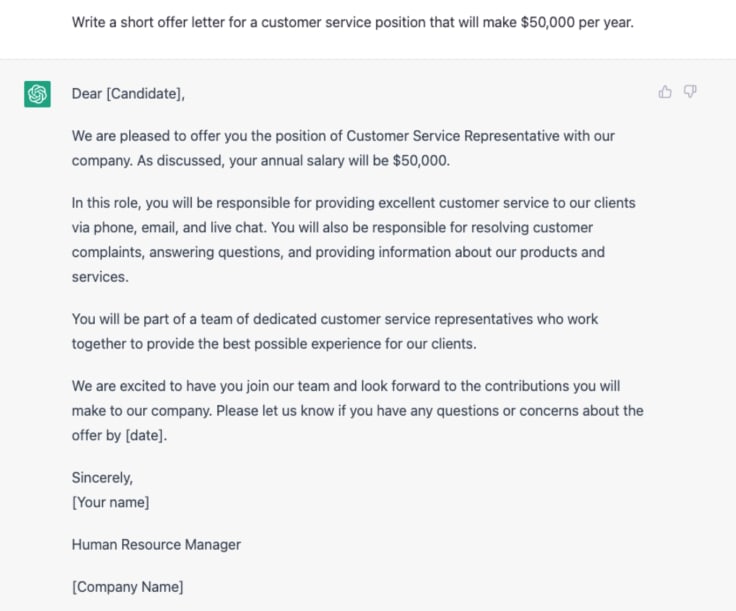
Why do more when you can do less? That's the beauty of AI.
Final thoughts
AI conversational tools are changing the world as we know it.
From AI-powered customer service agents to defense lawyers, we are only beginning to scratch the surface of what the future holds with AI.
But one thing is for certain. Conversational AI tools are here to stay, and they can help your business automate repetitive tasks, improve customer satisfaction, and provide 24/7 Business Customer Support.
Adding these AI conversational tools to your tech stack can free up time for your employees to focus on more complex issues or other growth initiatives. However, it's important to note that these tools are only as effective as the strategy and implementation behind them.
Measure twice and cut once when selecting the right tools for your specific needs. Hopefully, this article gives you a head start.
Which conversational AI tools will you incorporate into your business operations?



